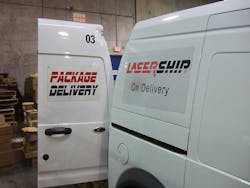New York authorities allege package delivery company has been shipping illegal cigarettes
It turns out that cigarettes do more than just harm your health. They affect your bottom line too.
LaserShip, a Virginia-based last-mile package delivery service, has been sued by New York City Corporation Counsel Michael A. Cardozo, Health Commissioner Thomas A. Farley, and Finance Commissioner Beth E. Goldman, for its role in the delivery of “untaxed” cigarettes. Shipping and delivering cigarettes that are untaxed is illegal under the federal Contraband Cigarette Trafficking Act (CCTA), the federal Prevent All Cigarette Trafficking Act (PACT), federal racketeering statutes, and New York state laws.
According to the complaint, LaserShip worked within a broader delivery network that avoided the requirements of the PACT Act. Under the PACT Act, cigarette sellers are required to assure all taxes are paid on the cigarettes shipped to consumers.
The delivery network was broken up by authorities in May 2013 when the city obtained a court injunction against Regional Integrated Logistics, a Buffalo, NY, logistics firm alleged to have been shipping untaxed cigarettes nationwide. The suit claims LaserShip joined the network in 2011 and shipped approximately 75,000 cartons of cigarettes into New York City prior to May 2013.
“All businesses, especially the package delivery industry, must understand the enormous legal penalties they face in doing business with cigarette traffickers. If you engage in these illegal activities, we will take aggressive action,” said Cardozo.
In September, four New York State District Attorneys announced a settlement with R + L Carriers for its involvement with shipping illegal cigarettes. The agreement made no admission of guilt on R + L’s part, but the company did make a $140,000 payment to the American Lung Assn. and the American Cancer Society as part of the agreement, which also called for R + L to set up compliance procedures to avoid future violations and an agreement of cooperation from R + L with what is a continuing investigation into illegal shipments of cigarettes within the state.
Federal law provides for penalties of up to $5,000 per violation for violations of the PACT Act or the CCTA, as well as treble (or triple) damages under federal racketeering statutes, which classifies cigarette trafficking as a “racketeering” offense. New York state law provides for a maximum penalty of $5,000 per delivery or $100 per pack of cigarettes delivered to a consumer, whichever is greater.
The city’s lawsuit also invokes Public Health Law § 1399-ll, which prohibits carriers from delivering cigarettes to consumers.
What these two cases say, however, is that trucking companies must have some awareness of what is being shipped. R + L admitted no wrongdoing in its settlement and LaserShip alleged involvement is now in the courts, so it’s difficult to say whether either company knowingly broke the law or not. Regardless, it is clear that, at least in New York State, violations of this kind are going to be pursued and prosecuted if necessary.
Carriers, then, could become unknowing accomplices and could face fines, criminal prosecution and a severe hit to their reputation if they are caught hauling illegal goods. And the old adage, “what you don’t know won’t hurt you,” does not apply in this case. Carriers must be aware of what they are hauling and build relationships with shippers to ensure that what is said to be loaded in their trailers are really what is being loaded.
If not, the authorities may be close behind.


